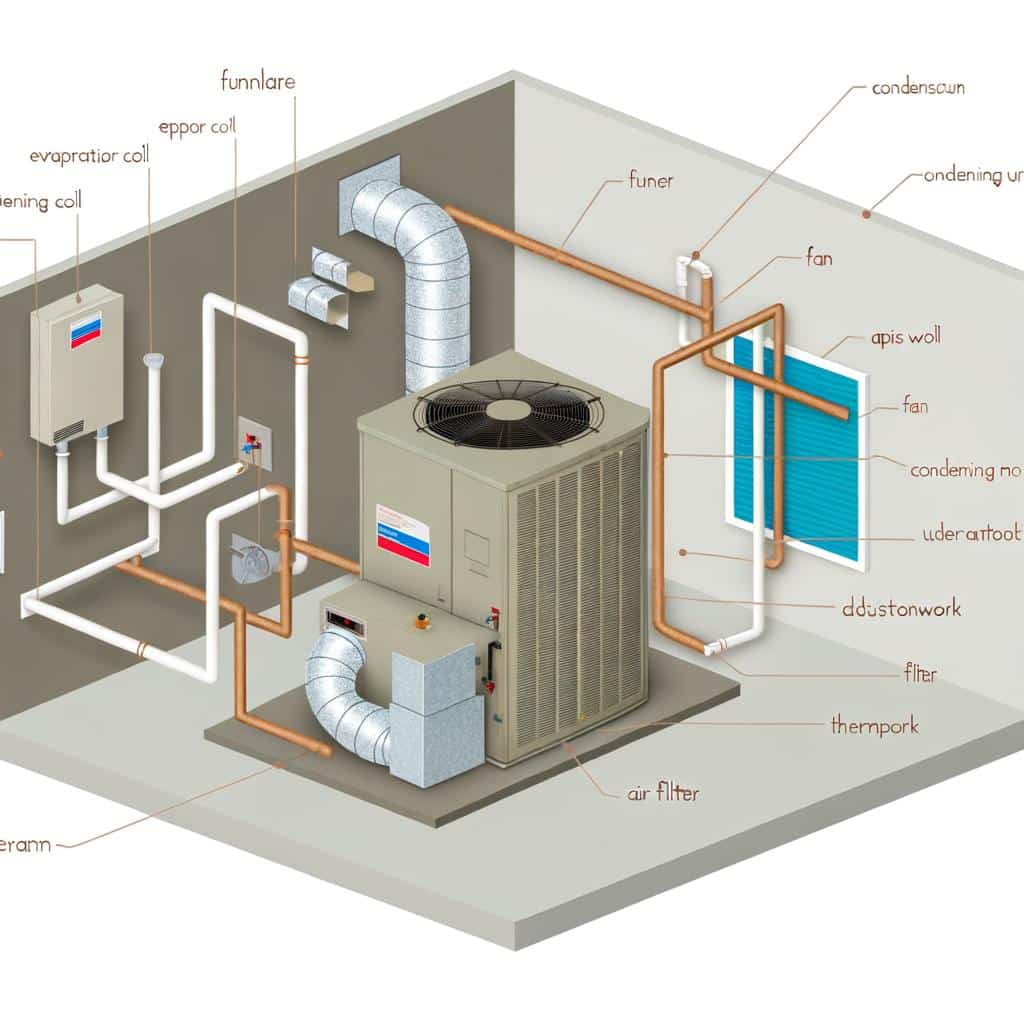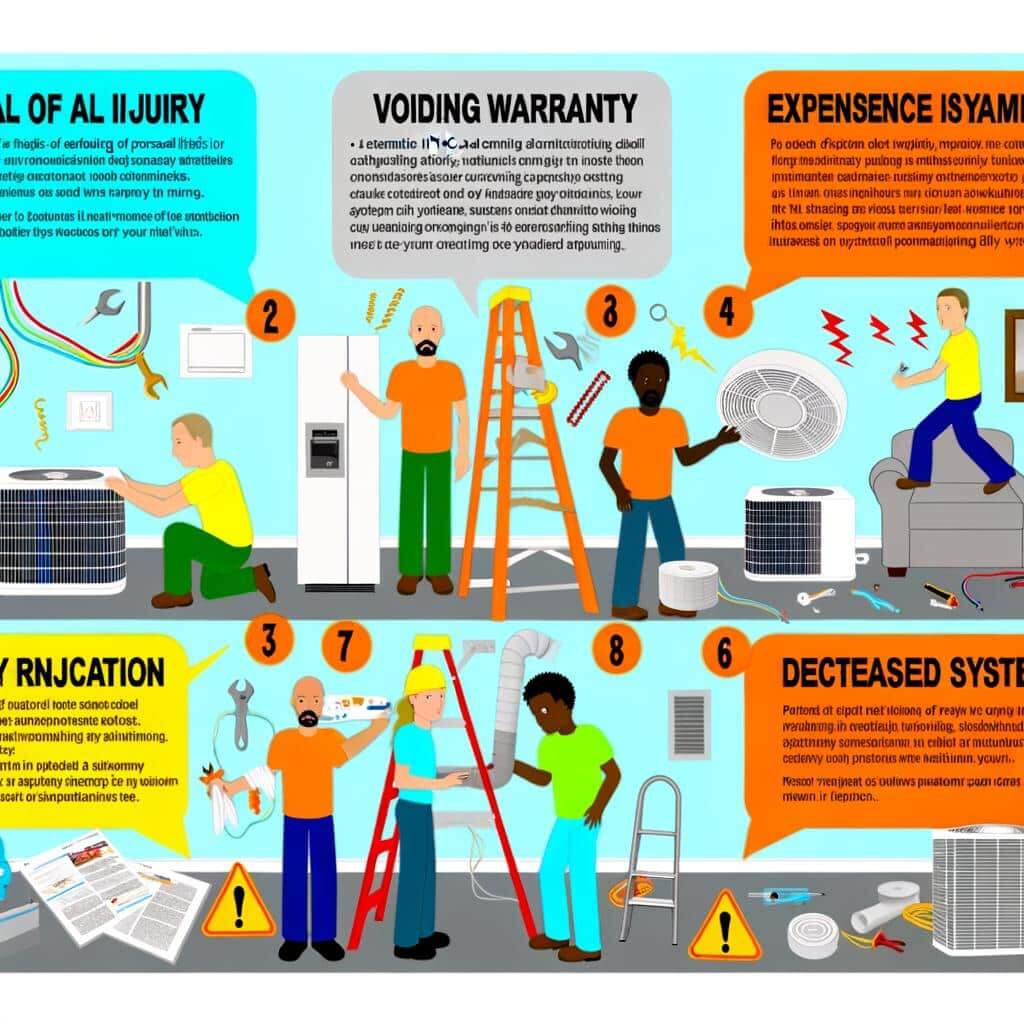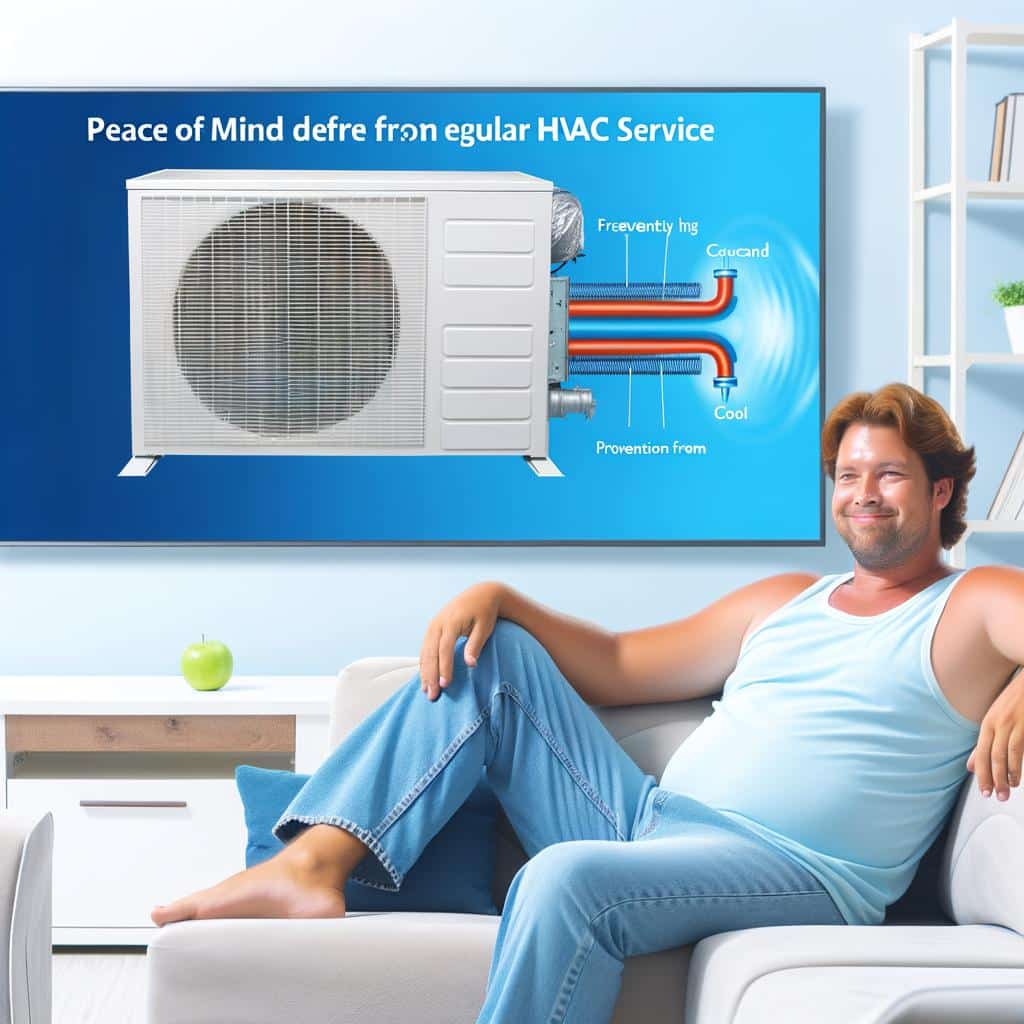Imagine this: the chilly winter winds are blowing outside while you snuggle comfortably in your warm abode. Suddenly, your once-cozy environment turns cold as ice. Panic ensues. Your trusted friend, your HVAC system, has let you down. In this chilling scenario, you’re faced with a crucial decision. Do you strap on your tool belt attempting to channel the spirit of home improvement aficionados, or do you reach for the phone to dial for professional help? Welcome to the world of “Do it Yourself versus Dial for Help”: the ultimate guide to assist you in navigating the tricky labyrinth of HVAC home tasks.” Let us delve into deciphering when it’s time to roll up your sleeves and when it’s wise to call in the cavalry.
Understanding the Basics of Your Home’s HVAC System
As a homeowner, it’s crucial to understand the fundamentals of your home’s Heating, Ventilation, and Air Conditioning (HVAC) system. This knowledge will not only help in maintaining the system, but also in diagnosing any issues that might crop up. An HVAC system is, in essence, responsible for regulating the temperature, humidity, and overall air quality within your home. It’s composed of three main components:
- Heater: Usually situated in the basement, this part of your HVAC system utilizes fuel (gas or oil) to create warm air.
- Air Conditioner: An outdoor unit using electricity and coolant liquid to lower air temperature and dehumidify your home in hot weather.
- Ductwork: These are the conduits that circulate warm or cool air throughout different rooms in your house.
The line between tasks you can execute on your own and those requiring the intervention of an HVAC professional can sometimes blur. As a rule of thumb, simple preventive and maintenance tasks usually fall within the homeowner’s purview. Examples of these include:
- Regular filter replacement: To ensure the continued efficiency of your HVAC system, filters should be replaced every 90 days.
- Cleaning: Vents and ducts often accumulate dust, which can result in an HVAC system’s performance degradation. Regular cleaning can prevent this.
- Basic troubleshooting: Familiarize yourself with common HVAC issues, like a non-responsive thermostat or an unusually loud system. Sometimes, the solutions are as simple as a battery replacement or tightening a loose screw.
However, if these simple fixes don’t resolve the issue, or you suspect the problem might be more complicated, such as a faulty motor or a refrigerant leak, it’s time to call in the professionals. Major repairs, yearly tune-ups, or system installations should always be left to licensed and experienced HVAC technicians, and should never be treated as DIY tasks.
When to Choose DIY: Simple HVAC Maintenance Tasks
Do-it-yourself projects can bring a sense of satisfaction, especially when they save you a substantial amount of money. The cost-efficiency of DIY is tempting and seemingly beneficial for homeowners when it comes to HVAC maintenance. However, not all tasks are meant to be tackled by an amateur.
The simplest task that you can do by yourself is changing the filters. Regular replacement of HVAC filters allows your system to function more efficiently and can extend its lifespan. This easy task requires no special skills and could save you unnecessary repair costs in the future. You can refer to the manufacturer’s instructions for how frequently you should change them, but as a rule of thumb, filters should be replaced every 30-60 days.
| Task | DIY or Professional |
| Changing Filters | DIY |
| Cleaning Exterior Unit | DIY |
| Thermostat Upgrade | DIY |
| Refrigerant Leak | Professional |
| Compressor Repair | Professional |
Another easy task is cleaning the exterior unit. Outdoor units could gather dirt, leaves, and other debris, reducing their efficiency. To clean it, you simply have to shut off the power, remove any debris, and spray it with a garden hose. Upgrading the thermostat can also be done by yourself if you want a new programmable thermostat that helps to save energy. Installing it can be quite straightforward if you follow the instructions properly.
However, for more complicated issues like refrigerant leaks or compressor repairs, it is much safer and more cost-effective in the long run to hire a professional. Untrained hands could potentially worsen the problem, leading to more expensive repairs or even a total system replacement.

Knowing Your Limits: HVAC Tasks Better Left to Professionals
Knowing when to tackle a job on your own and when to call an expert is crucial when dealing with HVAC systems. Some minor tasks such as routine maintenance, replacing filters, and cleaning around the system can usually be handled by the homeowner. It’s always a smart choice to take on these manageable chores as it can help extend the lifespan of your units, and potentially save on costs. However, there are specific tasks that should really be left to professionals. This includes installation of new units, dealing with the refrigerant, or trying to fix major electrical issues. It might be tempting to handle these by yourself, especially if you are trying to save money. But do remember that mishandling can potentially lead to more damages or even pose a safety hazard.
| DIY Tasks | Professional Tasks |
|---|---|
| Changing filters | Installation of new units |
| Cleaning around the unit | Fixing major electrical issues |
| Simple maintenance checks | Handling refrigerants |
These guidelines are a good starting point. However, anytime you find yourself unsure or uncomfortable with a task, it’s better to err on the side of caution and call a professional. It’s always better to invest in an expert’s service than risk costly damages or compromised safety.
Safeguarding Your System: Risks of DIY in Complex HVAC Jobs
While many homeowners are inclined towards accomplishing repair tasks themselves, tackling complex HVAC services can be risky. The draw of DIY projects isn’t surprising; saving money, gaining knowledge of the system, and having immediate control of the project are all appealing factors. Simple tasks like changing filters or cleaning ducts can be safe and rewarding DIY projects.
However, when it comes to more intricate tasks like installing a new HVAC system, fixing major leaks, deep cleaning of a system, or tackling electrical issues, it is strongly recommended to bring in a professional. The risks involved in DIY for complex HVAC jobs include:
- Potential damage to the unit: Improperly installing parts or missing cues for necessary repairs can lead to system failure.
- Risk to personal safety: Working with electricity exposes homeowners to potentially lethal shocks. Also, risking a gas leak can lead to intense health hazards or fire.
- Costs might escalate: Despite initial savings, if the DIY task goes wrong, it tends to increase the repair cost.
Drawing the line between DIY and professional intervention is paramount. Here’s a simplified table to guide you.
| Activity | Suggested approach |
|---|---|
| Changing Filters | DIY |
| Fixing Major Leaks | Professional Help |
| Installing a New HVAC System | Professional Help |
| Simple System Cleaning | DIY |
Remember, when it comes to HVAC, what you don’t know can hurt you, your wallet, and potentially your home. Leave the complex tasks to experienced professionals and ensure your system functions optimally for years to come!

Identifying the Right Time to Call Your HVAC Contractor
Knowing when to tackle an HVAC task on your own or when to call in a professional can often be a tricky balancing act. On one hand, a DIY approach saves on costs. On the other, a professional’s expertise ensures the task is done right, safeguarding the long-term health of your system. Let’s delve into a few scenarios.
Assessing routinely HVAC maintenance: These are tasks you can easily handle on your own. They include:
- Changing your HVAC air filters: HVAC air filters should ideally be replaced every 90 days. However, it would be best if you did it more frequently in times of high usage. air filters ensure the air circulating in your home is clean, leading to healthier indoor air quality. It also protects the system itself from dust buildup.
- Cleaning around your outdoor unit: A clean and clear outdoor unit operates more efficiently. Make sure there’s free flow of air around and through it. Trim any overgrown shrubs around the unit and remove any deposited leaves or debris.
- Inspecting your ductwork leaks: While this might sound complex, it merely involves looking for visible signs of wear and tear. However, remember that not all leaks are visible, so professional maintenance is still needed.
On the other hand, tricky tasks like replacing a broken HVAC component or installing a new system entirely should be left to trained professionals. Also, if your system constantly breaks down despite routine DIY maintenance, it might be time to call in your HVAC contractor.
In short, while some routine HVAC tasks can be DIY-ed to save on costs, others require professional attention to ensure the longevity of your system and continued comfort in your home. Know your limits, and when in doubt, always opt for professional assistance to avoid causing more harm than good to your valuable HVAC system.

Enjoying Peace of Mind: How Regular HVAC Service Prevents Ill-Timed Breakdowns
The routine maintenance of your HVAC system significantly contributes to its efficiency and longevity. Regular check-ups allow for early detection of potential issues thus mitigating the occurrence of unexpected breakdowns. More often than not, emergency repairs shake us out of our comfort zones and often cost more to remedy. Just like we visit doctors for regular health check-ups, our HVAC systems too require professional attention.
Here are a few reasons why scheduled HVAC maintenance is vital for your peace of mind:
Improved Efficiency: Regular servicing ensures all components of your HVAC are operating optimally. This cuts down on energy consumption hence reducing your energy bills.
Durability: Routine maintenance helps in increasing the lifespan of your HVAC unit by preventing wear and tear.
Comfort: A well-maintained system offers efficient heating and cooling thus enhancing comfort in your home.
Early Problem Detection: Regular check-ups allow technicians to notice and rectify potential problems early enough, thus preventing expensive repairs later.
| Servicing Task | DIY | Professional Service Required |
| Filter replacement | ✓ | |
| Tube Cleaning | ✓ | |
| Leaksealing | ✓ | |
| Thermostat settings adjustment | ✓ |
The table above discerns between tasks that you can accomplish on your own and those that necessitate the services of an HVAC technician. Handling tasks like changing filters and adjusting thermostat settings is quite straightforward. However, tasks related to internal mechanisms like tube cleaning and leak sealing are best left to professionals. The right care and attention given to your HVAC system will ensure uninterrupted service and peace of mind throughout the year.
In the grand tapestry of homeownership, HVAC issues present a unique blend of challenges. However, whether you’re armed with a wrench and a will, or a phone and a professional’s number, the art of maintaining comfort in your home can be mastered. The balance of when to DIY and when to Dial for your HVAC tasks is not set in stone, but the principles guiding it remain. Safety, cost-effectiveness, reliability, and technicality — these are our guiding stars to navigate the turbulent seas of HVAC problems. As we shutter the glows of this enlightening narrative, remember, it’s about knowing your limits and preserving your home’s peace and comfort — after all, it’s not just a house, it’s your habitat.




